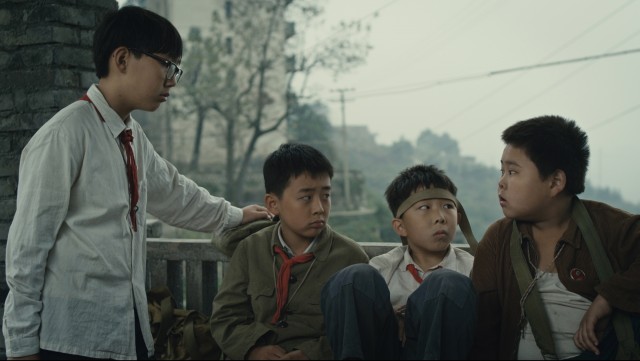
Four friends grow up during the end of the Cultural Revolution in Wang Xiaoshuai’s 11 FLOWERS
11 FLOWERS (Wang Xiaoshuai, 2011)
Quad Cinema, 34 West 13th St., 212-255-2243
Film Society of Lincoln Center, Elinor Bunin Munroe Film Center
Francesca Beale Theater, 144 West 65th St. between Broadway & Amsterdam Ave., 212-875-5601
Opens Friday, February 22
firstrunfeatures.com/11flowers
 Sixth Generation Chinese director Wang Xiaoshuai (Beijing Bicycle, Shanghai Dreams) reaches back into his childhood in the poignant, autobiographical 11 Flowers. Set in 1975 near the end of Mao’s Cultural Revolution, the film is seen through the eyes of eleven-year-old Wang Han (Liu Wenquing), who lives with his family in a poor, remote village in Guizhou province as part of the Third Front movement, in which the nation moved industry inland to protect it from possible Soviet attack. Wang’s father (Wang Jingchun) spends the week away from his wife (Yan Ni), son, and young daughter (Zhao Shiqi), working at an opera house in town. When one of Wang’s teachers, Miss Zhou (Yu Yue), tells Wang that he should get a clean shirt so he can look good as the new class gym leader, his mother at first is mad at him for even asking for such a luxury item but ultimately makes him one. However, while fooling around with his friends, Louse (Zhang Kexuan), Mouse (Zhong Guo Liuxing), and Wei Jun (Lou Yihao), something happens to the shirt, which soon winds up in the hands of a possible murderer (Wang Ziyi) on the run from the police. Based on actual events that happened to him as a child, Wang’s 11 Flowers is a beautifully crafted coming-of-age film, reminiscent of Rob Reiner’s Stand by Me. Wang, who was known as Wang Han when he was a boy, narrates the opening and closing himself, adding yet more personal touches to the tale. Hovering over the work is the specter of the Cultural Revolution; in one moving scene, adults have gathered for a small dinner party, but when one of them starts singing an old favorite tune, Wang’s father quickly changes it to a Mao-endorsed propaganda song for fear of being caught doing something against the government’s wishes. Much like Wang’s father teaches his son how to paint, interpreting reality on canvas, director Wang interprets his childhood reality onscreen in this small gem of a film.
Sixth Generation Chinese director Wang Xiaoshuai (Beijing Bicycle, Shanghai Dreams) reaches back into his childhood in the poignant, autobiographical 11 Flowers. Set in 1975 near the end of Mao’s Cultural Revolution, the film is seen through the eyes of eleven-year-old Wang Han (Liu Wenquing), who lives with his family in a poor, remote village in Guizhou province as part of the Third Front movement, in which the nation moved industry inland to protect it from possible Soviet attack. Wang’s father (Wang Jingchun) spends the week away from his wife (Yan Ni), son, and young daughter (Zhao Shiqi), working at an opera house in town. When one of Wang’s teachers, Miss Zhou (Yu Yue), tells Wang that he should get a clean shirt so he can look good as the new class gym leader, his mother at first is mad at him for even asking for such a luxury item but ultimately makes him one. However, while fooling around with his friends, Louse (Zhang Kexuan), Mouse (Zhong Guo Liuxing), and Wei Jun (Lou Yihao), something happens to the shirt, which soon winds up in the hands of a possible murderer (Wang Ziyi) on the run from the police. Based on actual events that happened to him as a child, Wang’s 11 Flowers is a beautifully crafted coming-of-age film, reminiscent of Rob Reiner’s Stand by Me. Wang, who was known as Wang Han when he was a boy, narrates the opening and closing himself, adding yet more personal touches to the tale. Hovering over the work is the specter of the Cultural Revolution; in one moving scene, adults have gathered for a small dinner party, but when one of them starts singing an old favorite tune, Wang’s father quickly changes it to a Mao-endorsed propaganda song for fear of being caught doing something against the government’s wishes. Much like Wang’s father teaches his son how to paint, interpreting reality on canvas, director Wang interprets his childhood reality onscreen in this small gem of a film.